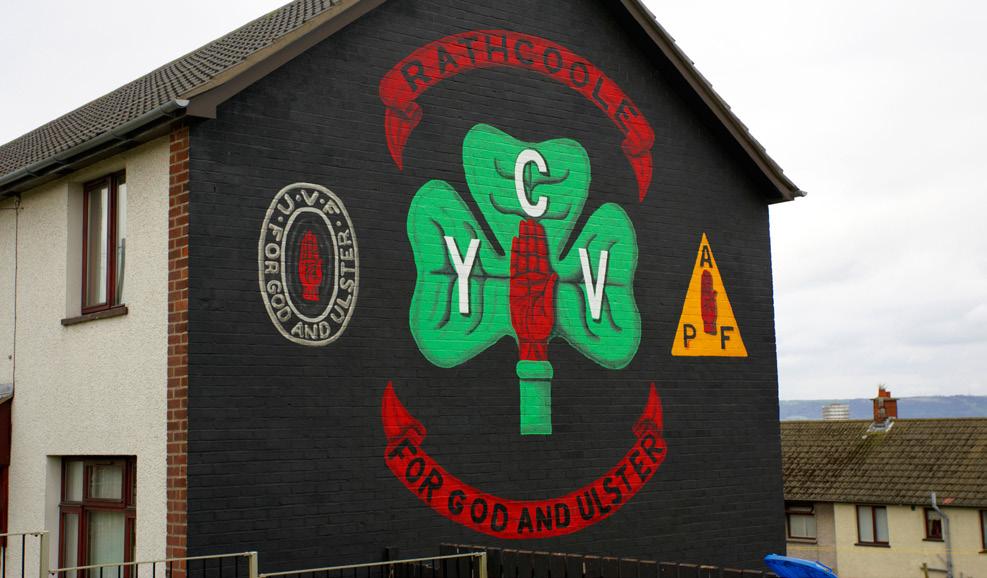
6 minute read
What can we learn from the Washington riots?
What can we learn from
the Washington riots?
Norman Hamilton reflects on scenes in the American capital at the start of the year, and highlights the importance of how Christians behave in matters of public debate.
Almost everyone on this side of the Atlantic was horrified at the riot in January in Washington, and the associated rhetoric in the months after the election took place for President of the United States.
Many of us who are committed Christians were even more horrified at the placards and banners at that riot which linked the names of Jesus and God himself with the need to keep President Trump in power, and to deny Joe Biden his rightful place as the 46th president.
During 2020 I read many articles from Christian leaders in the United States praising Donald Trump, and throwing their weight behind his campaign to be reelected, and indeed continuing to support him after the election was decided. But not all did, and some elected Christian leaders have been paying a very high price for the stance they have taken.
One of them is Congressman Adam Kinzinger from Illinois who was one of the few Republicans who voted for the second impeachment of President Trump. Christianity Today reported on his stance in these words:
“The backlash was swift, coming from Kinzinger’s district in northern Illinois, where a majority of Republicans disagreed, and from his fellow believers, with many white evangelicals continuing to support Trump even as his false claims encouraged rioters at the Capitol.
“Franklin Graham condemned Kinzinger and the other Republicans who voted for impeachment for turning their back on the president despite the good he had done on issues like abortion, foreign affairs, and religious freedom. ‘It makes you wonder what the 30 pieces of silver were that Speaker Pelosi promised for this betrayal,’ the evangelist remarked.”
Two days after Mr Kinzinger called for removing Mr Trump from office following the January riot at the Capitol, 11 members of his family sent him a handwritten two-page letter, saying he was in cahoots with “the devil’s army” for making a public break with the president.
“Oh my, what a disappointment you are to us and to God!” they wrote. “You have embarrassed the Kinzinger family name!”
So much of what has happened has left me as an evangelical believer feeling betrayed, compromised and even shamed by many of these other leaders for several reasons.
Firstly, they reduced the complexities of government to the stance of Donald Trump on a few highly contested issues of social policy – such as abortion and gay rights. I too am very conservative on these issues, but poverty, immigration, racism and healthcare are equally important (never mind other concerns such as defence, food standards, climate change and ‘big tech’). Too few of these leaders seemed to think


that presidential policy on such issues mattered just as much as social policy. It most certainly does if we are to have any hope of living in a more just and peaceful world.
Secondly, character matters in those who are elected. This was often sidelined or excused. Yet while it is clear that God can and does use all sorts of people for his purposes, nonetheless the Bible is explicit that “The integrity of the upright guides them, but the unfaithful are destroyed by their duplicity.” Indeed. And rightly so.
On top of these considerations, the riot and the storming of Capitol Hill showed an even deeper malaise. When politics is overlaid or veneered with religious convictions, danger abounds.
Here in Ireland we have seen that all too clearly on all sides in the last 100 years of our history. The 1916 Proclamation of the Easter Rising includes these words: “We place the cause of the Irish Republic under the protection of the Most High God, whose blessing we invoke upon our arms…”
“For God and Ulster” was the motto of the Ulster Volunteer Force, formed at the height of unionist opposition to home rule in 1912–1914.
Armed rebellion linked with calls for the Father of our Lord Jesus Christ to honour such use of force is simply scandalous when seen in the light of Christ’s own teaching and words. Jesus never associated himself directly or indirectly with armed rebellion – even against the foreign forces occupying his land during his lifetime. His insurrection was to turn the hearts of people to a loving God who was nonetheless sovereign over all the nations.
Christ’s teaching surely calls us to separate faith from any desire for raw political power. Furthermore, Christians must not embrace, even by default, any political ideology which cares little for the common good but plays to the whim of the electorate. Nor must we be captured by populist politics which despises what others do or regularly demonises them.
As we reflect on the shameful chaos in Washington, there are critically important lessons to be learned right here and right now.
Firstly, churches and Christian people must clearly separate and elevate their faith in Christ from any suspicion that their primary allegiance is to any political party, elected leader or party manifesto. On this issue, Congressman Kinzinger lamented what he saw as Americans’ disordered priorities – how they’ve allowed allegiances to the country, the economy, the president, or their political identities to distract from their primary identity as citizens of heaven. Here in Ireland, we need to pay equal attention to the dangers of this attractive idolatry, for the first of the Ten Commandments is unambiguous: “You shall have no other gods before me.”
Secondly, when grave wrong is being done or serious injustice perpetuated – whether in politics, society or the church itself – church leaders must clearly step up to the mark and spell out and publicly argue for what is right. To be silent is to acquiesce. Once again, the Bible’s standards are clear in Proverbs 16: “Good leaders abhor wrongdoing of all kinds; sound leadership has a moral foundation.”
Thirdly, as Christian people, we must take individual and personal responsibility to think for ourselves, to think biblically and not be easily manipulated fodder for media spin, social influencers, or any kind of ‘fakery’, however attractive it may be. In particular, there is the opportunity, the privilege and the responsibility to raise the level of public discussion here in Ireland. Much too often it is polarising, adversarial and demeaning of others. There is a devastating translation in The Message to the opening verse of chapter 18 of the book of Proverbs: “Loners who care only for themselves spit on the common good. Fools care nothing for thoughtful discourse; all they do is run off at the mouth.”
Christian people must take seriously the fact that public debate is not entertainment... it massively impacts how we think and behave. Many journalists work very hard to find and bring out the truth. Those of us in the church of Jesus Christ and in wider society need to have a parallel commitment to what is true – even if at times it is very uncomfortable... after all Jesus himself said, “The truth will set you free”.
Personally speaking, I sense an ever increasing need to take ever greater care of how my views, opinions and practices are shaped in a world where the forces of social pressure, fakery and trickery are ever more plausible and alluring. I sense a need to make sure that my mental and spiritual diet is not a tasty mixture, even by default, of political preferences, acquired prejudices, half truths, advertising, peer pressures, or even traditional Christian thinking. A much healthier diet would be better for me – and for us all – perhaps best summed up by the Apostle Paul in his letter to the Philippians: “Finally, brothers and sisters, whatever is true, whatever is noble, whatever is right, whatever is pure, whatever is lovely, whatever is admirable, if anything is excellent or praiseworthy, think about such things.” And surely it goes without saying – I need to practise them as well.
Very Rev Dr Norman Hamilton is a former Moderator of PCI.










